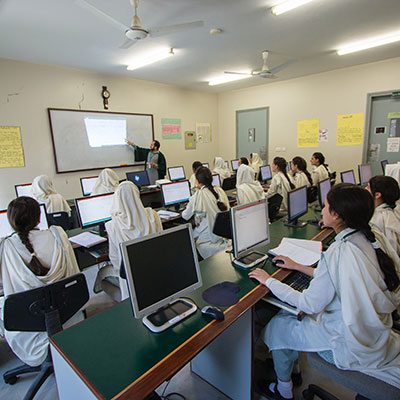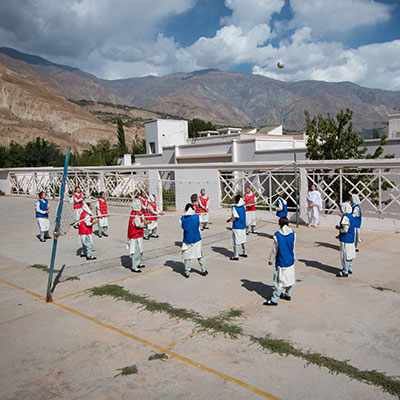

Classroom sessions are student-centered with a focus on interactive teaching that includes discussions, case studies and research projects.
To bring diversity and rigour to the learning experiences of our students, Aga Khan Schools have a two-fold curriculum approach. First, the syllabi prescribed by the examination boards are enriched, which means that the entire curriculum is reviewed and revised with special focus on certain themes and concepts. The teaching of English is skill-based, focusing on reading and critical thinking, writing skills, oral communication skills, as well as on the ethical and social dimensions of language learning. The Science teaching and learning focuses more on conceptual understanding and exploration. Our approach is inquiry-based and students learn through project work and practical experimentation.
In addition, the School is introducing Physical Education and Health, as well as PrISM — Personal, Intellectual, Social and Moral development — curriculums.
Classroom sessions are student-centered with a focus on interactive teaching that includes discussions, case studies and research projects. For assessment, the School is affiliated with the Aga Khan University Examination Board (AKU-EB), the only examination board in South Asia to integrate e-marking, or computer-based marking, in its assessment methodology.
Currently the School offers instruction in following areas:
The national curriculum is followed for grade VIII but teachers have made significant enrichments in the syllabus. The prime focus of the grade VIII curriculum is to give a strong basis in English, Mathematics and Science subjects. Other compulsory subjects like Urdu, Pakistan Studies and Islamiat are also part of the curriculum.
The School offers science subjects at Secondary level. These subjects include Chemistry, Physics, Biology, Mathematics, Pakistan Studies, Islamiat and Urdu. The School follows Aga Khan University Examination syllabus prescribed by National Curriculum Wing.
For Pre-Medical students, the schools lay the foundations for a professional career. The two years at Aga Khan Higher Secondary Schools are extremely important for the students’ personal and academic development, and preparation for a challenging professional journey.
The Higher Secondary Pre-Medical programme provides a general exposure to the basics of scientific inquiry. It is an entry point to a host of fields within medicine, such as Physiotherapy, Surgery, Pharmacy, Microbiology, Molecular Genetics, Biochemistry, Biotechnology, Bioinformatics, and so on.
The scientific skills of the students are polished in an atmosphere conducive to learning, and under the guidance of a fully-qualified, passionate and devoted faculty. Students attend lectures, take part in interactive sessions, and conduct practicals in well-equipped labs.
Higher Secondary Pre-Engineering provides general exposure to many aspects of basic scientific inquiry. All courses within the programme are designed to prepare students to pursue different fields of engineering such as Civil, Electrical, Mechanical, Aeronautical, Architectural, Telecom, Chemical, Environmental, Space and others. This is achieved through detailed lectures, interactive sessions, seminars, and practicals in well-equipped labs.
AKHSS, Kuragh recognises the importance of a well-rounded education and encourages co-curricular activities.
These activities are organised through the four school "houses". Each student joins a house at the time of joining the School and remains a part of it till she graduates.
Involvement in house activities inculcates a sense of responsibility amongst the students. Competition between houses produces healthy rivalry, teaches teamwork and encourages leadership and cooperation.


© Aga Khan Schools 2009 - All rights reserved
Terms & Conditions | Privacy Policy
The Aga Khan Schools are part of the Aga Khan Education Services,
an agency of the Aga Khan Development Network
© Aga Khan Schools 2009 - All rights reserved | Terms & Conditions | Privacy Policy
The Aga Khan Schools are part of the Aga Khan Education Services,
an agency of the Aga Khan Development Network